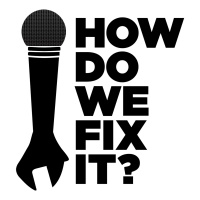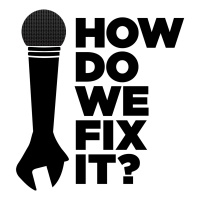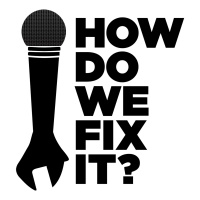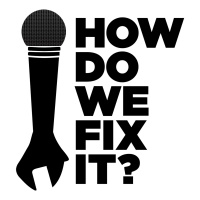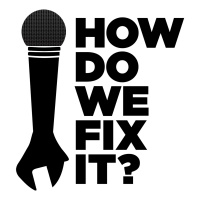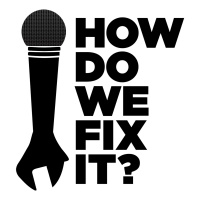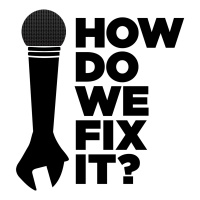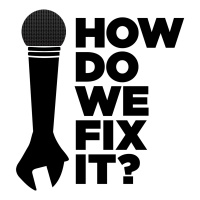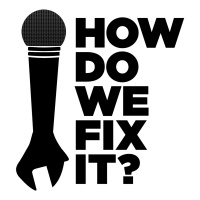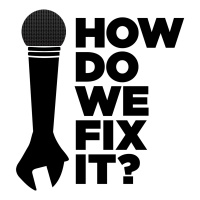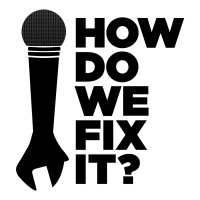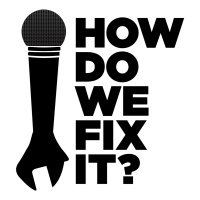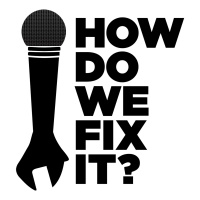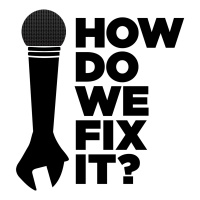How Do We Fix It?
- Autor: Vários
- Narrador: Vários
- Editor: Podcast
- Duración: 182:12:02
- Mas informaciones
Informações:
Sinopsis
From politics to the personal, we're about solutions. Our weekly podcast features two friends and longtime journalists. Join Richard Davies (ABC News) and Jim Meigs (Popular Mechanics) as they challenge authors, experts and provocateurs in a search for positive, practical ideas. Guests include Alan Dershowitz, a noted legal scholar and defender of civil liberties; Mike Rowe of "Dirty Jobs" and Lenore Skenazy, founder of "Free Range Kids." Topics include politics, parenting, personal finance, human behavior and much more. "How Do We Fix It?" - a repair manual for the real world. Produced by DaviesContent
Episodios
-
Fixing Capitalism: Luigi Zingales
12/04/2018 Duración: 26minFrom internet giants Facebook, Amazon and Google to telecom titans AT&T, Verizon and Comcast, American capitalism is increasingly dominated by huge and politically well-connected business behemoths.We look at the case for reform, including stronger anti-trust regulations, innovative use of the Interstate Commerce Clause, better pay for government regulators, and reform of the tax code.Our guest, finance professor, Luigi Zingales of the University of Chicago Booth School of Business, makes a crucial distinction between free markets and big business. Luigi is the author of two widely reviewed books: "Saving Capitalism from Capitalists (coauthored with Raghuram Rajan) and "A Capitalism for the People: Recapturing the Lost Genius of American Prosperity." He is also the co-host of the popular podcast, "Capitalisnt."In this episode of "How Do We Fix It?" Luigi presents arguments to reduce the power of crony capitalism and restore competition at all levels as an engine for economic growth and fairness
-
The World Is Getting Better: Gregg Easterbrook
05/04/2018 Duración: 27minThe facts are hard to deny. We live longer, infant mortality continues to fall, we are richer, less subject to violence-- and despite uneven progress, the world is more democratic than it was 50 years ago.And yet so many people are gripped by pessimism and fear.Donald Trump was elected President after repeatedly claiming "our country is going to hell." A recent poll found that just three-in-ten Americans think the country is headed in the right direction. The number of Americans who think the country has a strong national character declined sharply in the last two decades.Our guest, journalist Gregg Easterbrook is author of the new book, "It's Better Than It Looks: Reasons for Optimism in an Age of Fear.""If you're an optimist you think that problems can be fixed," says Gregg. "If you're a pessimist, you think the world is going to hell and there is nothing I can do about it."We look at why our pessimistic outlook has been blurred by the rise of social media, and is getting in the way of urgently needed refor
-
America's Leadership Crisis: Davia Temin
29/03/2018 Duración: 26minWith turmoil and never-ending drama in the White House, and record numbers of departures from top levels of the Trump Administration, it is safe to say that America is facing a leadership crisis. According to recent polls, a solid majority of US voters disapproves of Trump's leadership.In corporate America, the once-celebrated Facebook CEO, Mark Zuckerberg, is facing growing criticism over his late and insufficient response to privacy concerns and the Cambridge Analytica data hijacking scandal.University administrators, media titans and the leaders of the US Gymnastics movement have all faced angry protests for mishandling cases of sexual abuse, assault and harassment.This episode looks at how leaders can avoid the mistakes and embarrassment that could ruin their reputation, lead to their downfall and cause their employees and associates great harm. Our guest is the highly respected crisis communications and leadership strategist, Davia Temin.She speaks from a
-
Google is Forever. No Second Chances: Brian Hamilton
22/03/2018 Duración: 27minWhether it's Facebook, Twitter, Amazon, or Google; internet platforms are a huge force in our daily lives. The recent scandal over the Steven Bannon-affiliated Cambridge Analytica is the most recent example of the downside of data.This episode of "How Do We Fix It?" is about search, and how it can condemn former inmates to a life sentence without work. In their case, the internet is a "help not wanted" sign, preventing them from getting a job and putting their lives back on track. The cost to ex-prisoners and their families is enormous.Three-out-of-four ex-offenders are unemployed at least a year after they finish their jail sentence. Less than half are working five years after their release. At a time of almost-full employment, this is a drag on the economy. "When people get out of jail, their internet profiles can stay with them forever," says business executive, Brian Hamilton, founder of "Inmates to Entrepreneurs," an outreach group that helps ex-offenders start their own businesses. "There is system
-
Making Luck Happen: Janice Kaplan
15/03/2018 Duración: 29minWhat do Mark Zuckerberg, hockey great Wayne Gretzky, and best-selling novelist Lee Child all have in common? They all worked to make luck happen for them.In this episode with award-winning author, editor and journalist, Janice Kaplan, we learn about the exciting ways you can grab opportunities and improve your life. There is a clear difference between random chance and luck. The case is made in the new book that she wrote with risk-taking expert Barnaby Marsh, "How Luck Happens: Using the Science of Luck to Transform Work, Love and Life ."Luck includes chance, but it is not a one-time event and also involves a combination of talent, open-minded research, and hard work.We learn to how change the odds, why it may be important to move to places where your chances of success improve, and why having a positive outlook boosts your chances of long-term success.Winning the lottery, says Janice, "is not a great example of the kind of luck we're talking about, where you do have an input, where you can c
-
Reducing gun violence: What Works. James Burnett
09/03/2018 Duración: 34minThe debate over gun violence is deeply polarized, but almost everyone agrees it's an urgent problem and that far too many people are being killed and injured by firearms in the United States.The toll is more than 100 deaths per day-- a much higher rate than in other wealthy nations. Unlike the appalling killings in Parkland, Florida, Newtown, Connecticut, and at other schools, most gun murders involve a single victim and don't get national media coverage. Mass shootings account for less than 2% of all gun-related deaths.In this episode, we ask: of all the widely-touted proposals to reduce the rate of gun violence, which ones would actually work the best?Our guest James Burnett, Editorial Director of The Trace, an independent, nonpartisan newsroom that shines a light on America's gun violence crisis. We have an estimated 300 million guns in America-- about one for every household. But would banning military-style weapons and bump stocks be more effective than improving the system of federal background che
-
Will #NeverAgain Bring Lasting Change? Elizabeth Matto
01/03/2018 Duración: 24minWithin four days of the mass shooting at Margaret Stoneman High School in Parkland, Florida that left 17 people dead, Never Again was born.In this episode, we ask whether young millennials, who grew up after 9/11 during a time of school lockdowns, will become effective advocates for lasting social and political change.Digitally savvy students-- survivors of the massacre-- turned to social media with the hashtag #NeverAgain. This activist campaign for sweeping changes in gun control laws became a national phenomenon with a mass following on Twitter and other social media platforms. March For Our Lives is planned for March 24th by kids and families "to demand that their lives and safety become a priority and that we end gun violence and mass shootings in our schools," says the group's statement. "This generation has become more in tune and in touch with the avenues of political power," says Professor Elizabeth Matto, Director of the Center for Youth Political Participation at the Eagleton Instit
-
The Next Space Race: Joe Pappalardo
21/02/2018 Duración: 26minThe impressive launch of the Falcon Heavy rocket by SpaceX from the Kennedy Space Center in Florida, and the touchdown of two boosters back at Cape Canaveral minutes later, are the latest milestones in a thrilling comeback story. Space is becoming sexy again and the pace of innovation is remarkably fast.Not since the days of John Glenn,the Apollo moon launch, and the Space Shuttle program has spaceflight been so exciting.In this episode, technology journalist Joe Pappalardo, author of the new book, "Spaceport Earth: The Reinvention of Spaceflight", tells us why the emerging space race is different this time, and includes a vital role played by SpaceX, Blue Origin and other private companies. Their drive may lead to stunning advances in the human quest to explore and understand the universe.The goal of entrepreneur and billionaire visionary Elon Musk, is to put men and women on Mars. In addition to the shining ambition of interplanetary travel, Musk's firm, SpaceX, has already sharply cut the cost of rocket la
-
Healthcare Data Revolution: Dr. Joe Habboushe
14/02/2018 Duración: 25minWouldn't it be great if consumers could access all their personal medical records quickly and share them with doctors, family members and others they trust?This could lead to revolutionary changes in patient outcomes with less bureaucracy and fewer medical mistakes and unnecessary tests. In recent weeks, major announcements by Apple and Google, plus a new healthcare alliance by Amazon, Berkshire Hathaway and JP Morgan Chase are signs of accelerated change.No one is better equipped to interpret these changes than physician and entrepreneur, Dr. Joe Habboushe, our expert guest on this episode of "How Do We Fix It?"Joe is CEO of MD Calc--a leading online medical tool for clinical decisions by physicians-- and a specialist in emergency medicine at NYU Medical Center in New York.On this show we look at opportunities and hazards in the changing relationship between doctors and parents. We discuss privacy concerns and examine how data, smartphone apps and other innovations could reduce costs and lead to better
-
The Truth About Self-Driving Cars
07/02/2018 Duración: 19minIt's time to put the brakes on the hype about self-driving cars. Despite industry and media forecasts, it may be more than a decade before many fully autonomous vehicles are on the road. Lawsuits and patent disputes are among the many hurdles that face auto manufacturers and tech firms.But this doesn't mean that technology is being thrown into reverse gear. Semi-autonomous cars with vehicle assist and other features are much safer than earlier generations of automobiles. Self-driving delivery trucks and vans are no longer a fantasy. "Fix It" guest Eddie Alterman, Editor-in-Chief of Car and Driver magazine is deeply skeptical about the widely-touted changes proclaimed by major manufacturers. "It's a scary concept anyway you look at it," he tells us. "The autonomous car is a very inelegant, very complex and a very fraught solution to the problem of texting while driving... and of information coming into the car when people should be driving."For Google, Apple, Microsoft and other big data co
-
When Will Wall Street Crash? Diana Henriques
01/02/2018 Duración: 29minThe U.S. stock market has soared about 40% since the Trump election. But is it over-valued and ready for a meltdown?Shortly before the worst one-day crash in history in November 1987, the market had been charging ahead, with a 40% rise that year. The economy was on a roll, just like today. What would happen if giant investment funds bailed out of stocks at the same time? Would there be another financial crisis, even worse than the events in 2008?"We are more vulnerable to a radical readjustment," says our guest, New York Times journalist, Diana Henriques, author of the widely praised "A First Class Catastrophe: The Road to Black Monday, the Worst Day in Wall Street History.""It is important for us always to remember that markets go up and they go down, says Diana. "What we need to worry about is do they fall apart when they fall.""Even professional money managers today are alarmed at the fragility of market structures on which they rely."In this episode, we look at potential solutions, including str
-
50/50 Nation? No! Morris Fiorina
25/01/2018 Duración: 29minFrom the recent government shutdown to strict partisan votes on taxes and healthcare, official Washington lurches from one fight to the next, with no end in sight.But the American public is not as polarized as the pundits say.While elected Republicans and Democrats appeal to their base, and are more divided than ever, the electorate has not changed dramatically in recent years. According to Pew Research and other pollsters, moderate independents outnumber either liberal Democrats or conservative Republicans. Stanford University political scientist Morris Fiorina confronts the widespread assumption that voters are neatly split into rival camps, and argues that neither party can hold a majority for more than a few years. His new book is "Unstable Majorities: Polarization, Party Sorting and Political Stalemate." We discuss solutions, including open primaries, weekend voting, easier voter registration and independent redistricting-- all designed to encourage citizen involvement in the political sy
-
The Dangers Of Utopia: Michael Shermer
18/01/2018 Duración: 22minBy overwhelming majorities, human beings have faith in the afterlife. While fewer Americans believe in God, as many as 80% still believe in life after death. Surprisingly, this includes one-in-three agnostics and atheists. According to the Roper Center for Public Opinion the numbers have stayed stable in recent decades.Does this human refusal to accept that all we have is the here-and-now lead to a dangerous belief in religious fantasies and utopia? Do we chase after myths while ignoring practical steps we could take now to improve life for ourselves and others?Our guest, Michael Shermer, is the publisher of Skeptic Magazine and the author of the new book "Heavens on Earth: The Scientific Search for the Afterlife, Immortality, and Utopia." Astrophysicist Neil deGrasse Tyson calls him "a beacon of reason in an ocean of irrationality."Michael walks us through efforts by "techno-optimists" to extend life hundreds of years into the future, from cryonic suspension-- efforts to freeze our brains with all of their n
-
Ending Sexual Harassment: Claire Cain Miller
10/01/2018 Duración: 26minThe fight against sexual harassment was the hot topic in Hollywood at the Golden Globes Awards, with outspoken and inspiring remarks by Oprah Winfrey, Reese Witherspoon and others. But allegations of bullying or inappropriate behavior by powerful men are still being made almost every day.Despite widespread outrage, little focus has been given to effective measures that can be taken by employers to reduce the number of cases and improve the workplace environment. Our guest is journalist Claire Cain Miller, who writes about gender, families and the future of work for The Upshot, a New York Times site that covers policy and economics. She tells us what works and explains the challenges ahead in the fight for gender equality and respect. A recent survey found that nearly half of women said they had experienced some form of sexual harassment at work at least once in their careers. A 2015 study revealed that only one-quarter to a third of women who experience sexual harassment report it.Solutions:Em
-
What's Ahead in 2018: Richard and Jim's Forecast
27/12/2017 Duración: 22min2018 is certain to bring surprises. In this episode, Jim and Richard bravely venture out onto the high diving board of ideas and plunge into the pool of predictions. We also asked listeners and "How Do We Fix It?" guests for their forecasts of the year to come.Well-known author and skeptic Michael Shermer says "2018 will be the best year in the history of humanity as measured by health, longevity, medicine, technology, science and culture."Disruptive marketer and communications designer Geoff Colon tells us that "people are tired of how noisy the world has become. So I see more people deleting apps from their phones and spending less time in the Twitter-verse."Jim and Richard give their predictions on the 2018 mid-term elections and the new tax code (they go out on a limb here). Both forecast troubled days ahead for Facebook, Google and other giant internet firms, as they run into a buzz saw of criticism over their business practices. On the international stage, Richard predicts the U.S. will continue it
-
Food & Health: Science vs. Myth:The Science Moms
20/12/2017 Duración: 22minIt's time to shift the narrative about food and health from fear to facts. Popular culture promotes all sorts of anti-scientific myths, from astrology and conspiracy theories to vaccine denial and misinformation about GMOs.On this episode our guest is "Science Mom" Kavin Senapathy, one of five mothers of young children who decided to collaborate on communication and push back against a conspiratorial mindset around biotechnology. They argue that there's an epidemic of bad science and fear-based marketing largely aimed at parents of young children. Kavin writes for Forbes and Slate. Other Science Moms are writers and working scientists with PhDs—in biology, genetics, neuroscience. The crowdfunded Science Moms documentary is available for download on the Science Moms website.On this episode, Jim, Richard and Kavin look at solutions, such as fighting back against hype and anti-science ideas with better education for children and adults. We examine how social media has weaponized debate, including attacks on
-
Facebook and YouTube Threats: Zeynep Tufekci
13/12/2017 Duración: 30minBillions of people use Facebook and YouTube. But do social media platforms threaten our privacy and our freedom? The problem goes well beyond hate messages and other forms of inappropriate content, or fake news and "dark posts"— targeted ads not visible to the public. "The crucial problem here is we have no protections about the data that's collected," says our guest, Professor Zeynep Tufekci. "We have no protections about how that data is used and we have a business model where we are the product and not the customer." Zeynep is the author of the critically-acclaimed book, "Twitter and Tear Gas: The Power and Fragility of Networked Protest." At the University of North Carolina, she teaches a class: "Big Data, Algorithms and Society.""They have all our data...They control all the gatekeeping," Zeynep says of Facebook and other internet giants. "The threat that I fear is that we're building the infrastructure for a sort of soft authoritarianism." Much of the information these companie
-
The Truth About Robots: Peter Cappelli
06/12/2017 Duración: 25minOnce again the alarm bells are ringing. A new study by the McKinsey Global Institutes estimates that within 12 years, up to 800 million of today's workers may be replaced by robots or some other form of automation. Other recent research reports on the impact of technology are even more disturbing. A survey by PriceWaterhouseCoopers, the professional services company, claims 38% of U.S. jobs are at high risk of being replaced by robots and artificial intelligence over the next 15 years.But what if many experts are wrong? Peter Cappelli, Director for Human Resources at the Wharton School is our guest in this episode. His research is both contrarian and eye-opening. Peter has been named one of the most influential thinkers of the decade by HR Magazine, and is the author of "Why Good People Can't Get Jobs." In this episode, we discuss the paradox of the tax code, which gives incentives to companies to spend money on new technology INSTEAD of re-training workers. Peter also gives constructive insigh
-
Why Migration is Good: Leonard Doyle
30/11/2017 Duración: 18minWhat do you think of when you hear the word “refugee” or “migrant”? If over-crowded rafts or vast tent encampments come to mind, you are not alone.But there’s a very different— and much more positive side to migration. Across the world, record numbers of people are on the move in search of new opportunities and a better life.One solution to the vast increase in global migration is to gain a deeper understanding of the opportunities and challenges resulting from a more deeply connected world.Former journalist, Leonard Doyle,head of Media and Communications at the UN Migration agency IOM, is our guest. This episode discusses immigration reform, the surprising impact of Facebook and other social media platforms in promoting migration and the great contributions many migrants and refugees make to the new societies they join. See acast.com/privacy for privacy and opt-out information.
-
A Fresh Look at Freedom: Russell Shorto
21/11/2017 Duración: 29minWe discuss the American Revolution through six different pairs of eyes with acclaimed historian and journalist, Russell Shorto, author of the new book, "Revolution Song."This episode examines the meaning of freedom in a fresh new light and has special resonance during the week of Thanksgiving. As he did with "The Island at the Center of the World," which looked at the Dutch impact on Manhattan and the founding of the nation, this book examines American values, drawing deeply on diaries, letters and autobiographies to flesh out six important lives. They include an African-American man who freed himself and his family from slavery, a Seneca tribal warrior who became a wise and respected political leader, and George Washington himself. When he began working on "Revolution Song" six years ago, "I thought I was doing history," Russell tells us. "I thought these things were long ago settled. I didn't think I would be living in a time when freedom of the press, freedom of religion and freedom of speech wou

